Table of Contents
National Interest and Its Instruments:
“The foreign policy of every country”, writes Palmer and Perkins, “is at all times presumably designed to promote the national interest”. This national-interest approach in the conduct of foreign policy is vigorously supported by the followers of the realist school of thought. One of the main spokesmen of this school is Prof. Hans J. Morgenthau, who argues in his various writings that “it is not only a political necessity but also a moral duty for a nation to follow in its dealings with other nations but one guiding star, one standard for thought, one rule for action: The National Interest”.
Prof. Morgenthau is of the view that national interest has an essential minimum meaning inherent in the concept itself and in addition a whole gamut of meanings that are logically compatible with it. Its essential meaning is national survival which means the preservation of the integrity of the nation’s territory, of its political institutions, and of its culture.
The ends of policy are determined by interest, and the capacity to achieve such ends is determined by available power. Therefore, a realistic political analysis says Prof. Morgenthau, turns upon the concept of interest defined in terms of power.
Meaning of National Interest:
The term ‘national interest’ has been defined in a number of ways. According to Charles Lerche and Abdul Said national interest is the “general, long-term and continuing purpose which the state, the nation and the government all see themselves as serving”. V. V. Dyke defines it as “that which states seek to protect to achieve in relations to each other”. In a volume published by Brookings Institution the term national interest has been defined as “what a nation feels to be necessary to its security and well-being”. Again: “National interests reflect the general and continuing ends for which a nation acts”.
The above are some of the definitions given by various authors. But the term national interest is not yet clearly defined. Prof. Brower while summarizing the writing of the most notable authors of this aspect of international politics including Prof. Hans J. Morgenthau tells us frankly that among the scholars some of those who have used “national-interest” with the most authoritative ring in their writings, have done the least in clearly defining it. As such we agree with the conclusion of Prof. Brower that ‘the national interest’ is not susceptible to a single acceptable definition, and that it is a highly subjective term, the definition of which depends almost entirely upon specific content given to it by a particular person at a particular time.
We can also say that “despite changed meanings, national interests are the constants rather than the variables of international relations”.
Instruments For the Promotion of National Interest:
After dealing with the meaning of national interest we come to study the most important aspect of national interest as to the various instruments or elements or factors which help the nation in the promotion of national interest. These can be broken as under-
Diplomacy:
The first and the foremost instrument for the promotion of national interest which is generally adopted by every nation is ‘diplomacy’.
The first and the foremost function of the diplomat is to represent his government in ceremonial and social functions such as state dinners, receptions, happy and sad occasions of the government to which he is accredited. He also represents his government in many legal aspects. He may be authorized by his government to sign treaties and such documents. He is also the legal protector of the people of his country. He may also represent his government in international conferences and act there according to the instructions of his government.
The diplomat, as he is the representative of his country, has to take particular care that neither by his conduct nor by his talks does he bring discredit to his country. His style of living has to be such as to maintain his proper dignity. In appearance, behaviour and general contact with people, he should be careful not to forget that his individual personality is submerged in that of a representative of his country.
A diplomat is also to report his findings to his government. These reports, in fact, are the basic tools of a foreign policy. So, “Diplomat must”, write Palmer and Perkins, “above all, be good reporters; if they have the ability to estimate trend accurately if they keep an eye out for all useful information, and if they present the essential facts in a concise and intelligible form, they may be worth a king’s ransom”. Major aspects of the reports include the political, economic and social conditions of a country in which a diplomat is stationed. The home government will also be interested to know about the key persons in politics, governments, labour and industry. The information regarding industrial production, public opinion, agriculture, natural resources, finance, legislation, defence forces and the like is very useful to the home government.
Political reporting has to be objective, factual and carefully weighed. It is essential that facts, which might be pleasant to the government at home, should not be concealed. The object of a report is to enable the government to judge the situation. So while an Ambassdor’s judgement should be advanced with lucidity, persuasiveness and vigour, the material should be provided for the government to come to its own conclusion. Also, reports should not be merely a collection of rumours, speculations and social gossip, they must be primarily an analysis of political, social and economic trends, based on study and observation”.
As such to achieve his main object i.e. the promotion of national interest, the diplomat has to handle every situation very tactfully. The most important function of a diplomat is to promote and protect the interest of his country. “His duty”, writes Palmer and Perkins, “is to look after the interests of his country as interpreted by the policymakers back home and in accordance with treaties, other international agreements and principles of international law”. So his main duty is to secure the safety and interest of his own government. “If that safety and security can be won by peaceful methods hs should work for peace. If they cannot be won by peace it does not follow that he should try by every means to alter the circumstances in his own favour”. The best way of furthering the interest of his country is not by trying to obtain spectacular success by steadily building up a reputation for firmness, fair dealing, dependability and friendliness. His main duty is also towards his countrymen who are living in a state to which he is accredited. For the promotion of his nation’s interest, the diplomat makes every possible effort.
Propaganda:
The second instrument for the promotion of national interest is propaganda. Throughout history, statesmen have used the device of propaganda to impress other nations with the power their own nations actually possess. However, it is just in the twentieth century that states have established permanent agencies for the exploitation of the possibilities of propaganda to achieve their purpose. Due to revolution in communications, expansion of educational facilities and development in the scientific sphere, propaganda has become a major instrument of the policy of prestige.
Now nations are busy in their attempts to attract other nations to their way of life. Now embassies contain certain “cultural attaches” who use lectures, pictures, posters etc. to glorify their country. The United States Informative Service, “tells America’s story abroad”. Similar is the case with the British Council which performs similar functions for Britain.
In addition to the above methods, nations usually use some other devices also. In the Olympic games, the Russians, as well as the Americans, attempted to prove that their systems could produce athletes superior to those of other countries.
Soviet leaders have used this device frequently to achieve their purpose. “Propaganda”, wrote Lenin, “is of crucial importance for the triumph of the party”. Russia made good use of the slogans such as people were subjected to the propaganda that the German Army had never been defeated. Mussolini’s propaganda machine was successful and developed many techniques which the Nazis copied.
Imperialism:
The third and the crudest method, which was employed by most of the conquerors of all times for the promotion of national interest was imperialism. Military imperialism seeks conquest by means of direct military attack. Thus the great conquerors, such as Hilter, Napoleon, Louis XIV, Mussolini and many others, often used this method of military conquest on the ground that it enabled them to achieve their goal very quickly. But as a matter of fact, this method is the most dangerous because war is a gamble and nothing can be said about its results. Nazi Germany waged war to achieve its imperialistic ends but she lost it and even fell victim to other imperialistic powers. Pakistan in 1965 started a war with India, to gain its imperialistic motives but she lost.
Display of Military Force:
The demonstration of military force is another important instrument through which a nation can impress others with its power and can promote national interest. At the two atomic bomb tests in the Pacific in 1946, the United States invited foreign observers to show them their superiority in technological achievements. The New York Times reported, “Twenty-one observers from the United Nations Atomic Energy Control Commission agreed today that the United States was bombing a group of ships larger than many of the world’s navies”. In this way, the United States impressed the other nations with its technological achievements and with its naval superiority over others”.
The success achieved by the Americans and the Russians in the space programme enhanced America’s and Russia’s national prestige.
Since 1945, the most awesome displays of power have been the tests of the atomic and hydrogen bombs. Several nations have thus effectively paid attention to their nuclear developments.
The most important form of demonstrating military force is through mobilization. The mobilization of an army in the past and in the present by the great powers was clearly meant to show their military strength and their superiority over others.
Economic Aid:
Diplomatic means are used by big powers for the promotion of national interest to establish a national presence in the under-developed countries through the operation of programmes of economic aid. This form of presence has been used both to demonstrate official friendships and to influence the state of world politics. To establish a national presence the big powers use the services of thousands of employees. These employees are stationed abroad. Besides the official community abroad, there are thousands of missionaries and voluntary service agencies who offer educational and medical services to these under-developed countries.
Establishing a favourable presence abroad is a traditional diplomatic activity. Humanitarian gestures and ceremonial gifts offered by the great powers to small nations through ambassadors have been occasions for a display of national virtues. Ceremonial gifts have also been given in traditional diplomacy to establish a national presence. Prof. John D. Montgomery pointed out in this context that foreign aid at present is used as a means of establishing a national presence; but for the most part, such efforts do not depart significantly from traditional diplomacy. They are usually conceived in response to the desire of the government of the host country, but as the cost of establishing a national presence has risen in proportion to the gains, foreign aid programmers have begun to wonder why economically and technically sound projects cannot serve the same purpose and better. The fact is diplomatic foreign aid, although responsible for most of the popular criticism of the programme, represents a very small proportion to the total effort…….
Religion:
A nation can also promote its interest through religion. Missionary organizations, in the past, were among the active groups which promoted national interest. The annexation of Siam by France in the 17th century was very much due to the hard work of Jesuit missionaries. Time and again the British missionaries played an important part in promoting imperialism. The London Missionary Society was very much active in spreading British imperialism in Africa. Livingstone, the famous Scottish missionary to Africa, Fabri, inspector of the German missionary society, active in South West Africa, Henry Morton Stanley, an imperialistic explorer in Central Africa and Sir Harry, an empire builder in Africa, were some of the outstanding names among the missionary empire-builders. All these missionaries promoted imperialism in a masterly style. In the eloquent tongue, Henry Morton Stanely in his speech before the Manchester Chamber of Commerce fused mercantile and missionary motives in the nicest way. “There are forty million of people beyond the gateway of the Congo, and the cotton spinners of Manchester are waiting to clothe them. Birmingham foundries are glowing with the red metal that will presently be made into ironwork for them and the trinkets that shall adorn those dusky bosom, and the ministers of Christ are zealous to bring them, the poor benighted heathens, into the Christian fold”.
Conclusion- To conclude, we may say that the above instruments are most important for the promotion of national interest.
We agree with Plamer and Perkins’ remark that the concept of national interest is a very useful one and the policymakers should never forget it. It helps to place foreign as well as domestic policy in the framework of national policy, and it is a much-needed antidote to political short-sightedness and partisanship.
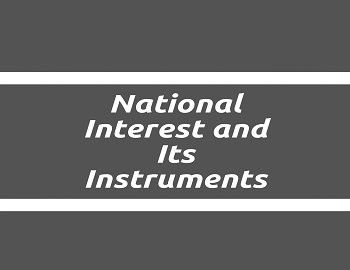
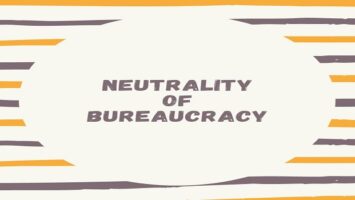
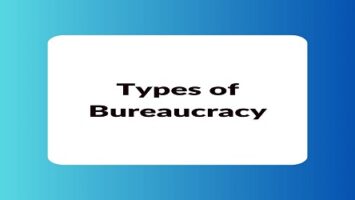
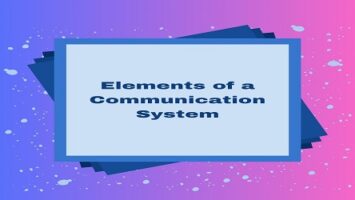
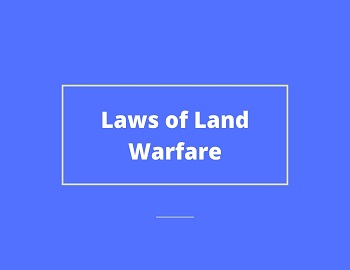

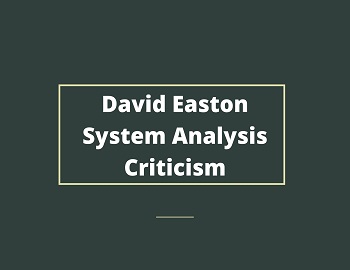
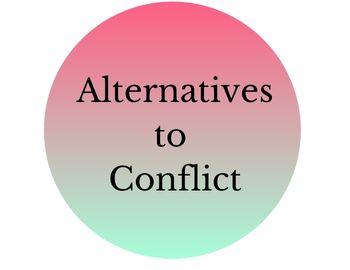
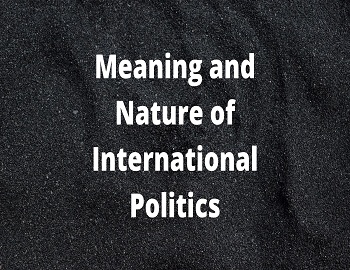
Comments (No)